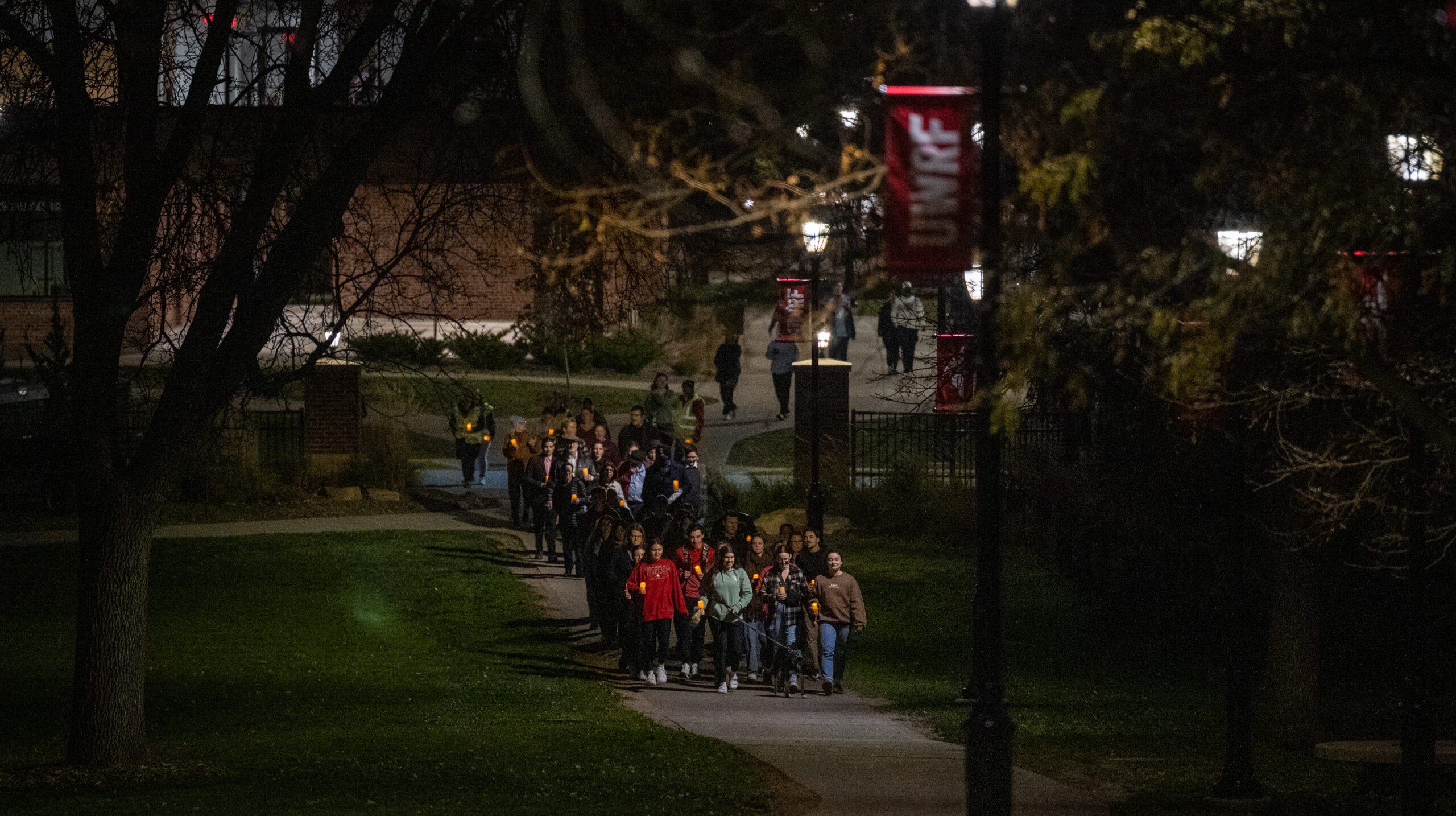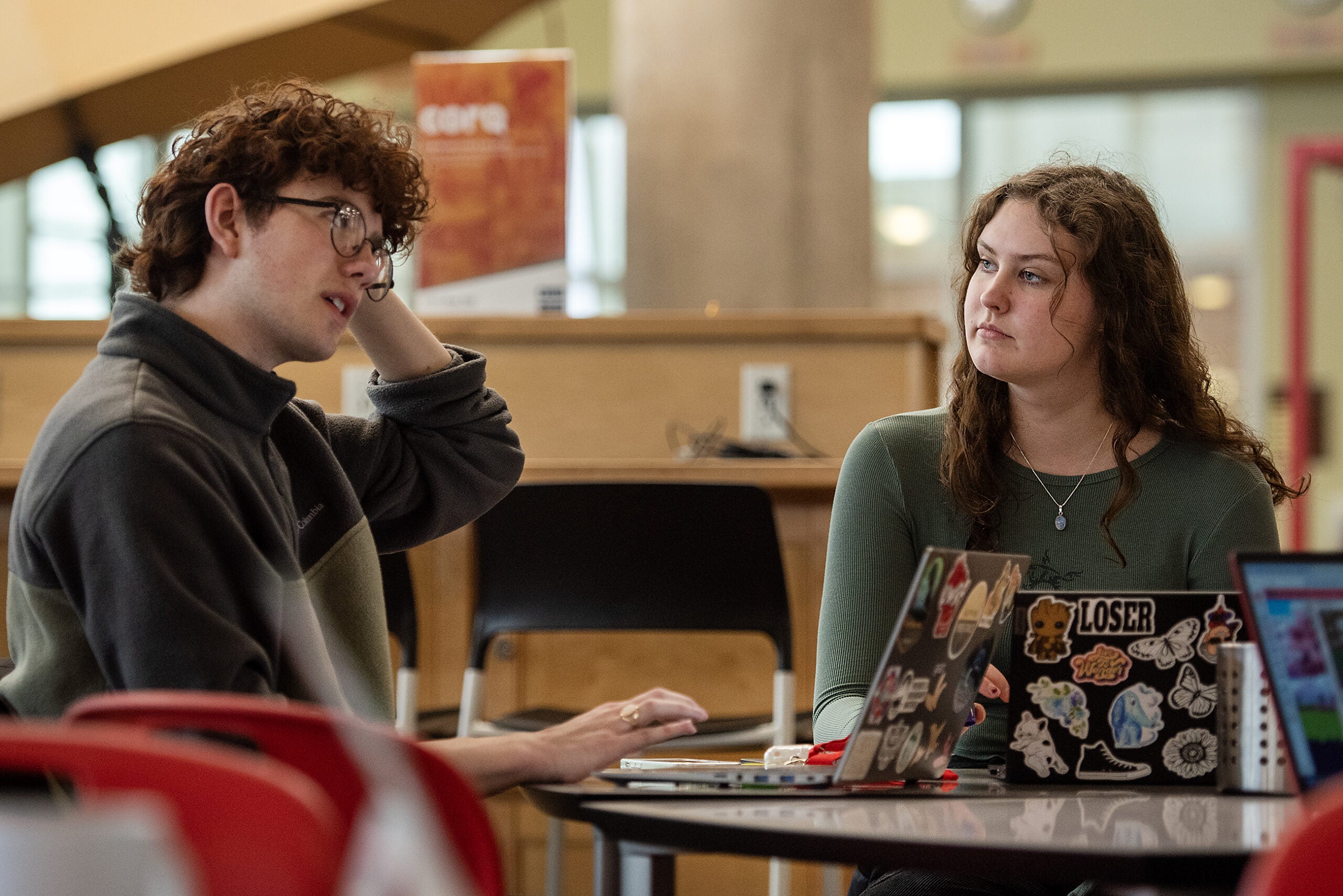University of Wisconsin-River Falls students are returning from winter break while the school grapples with how to address a mental health crisis on campus that’s mirrored across the country.
Sophomore Isabella Chavira died on Oct. 3; junior Sabrina Hagstrom died Oct. 31 and freshman Jasmine Petersen died Nov. 3. The three women’s obituaries said they had each struggled with depression and took their own lives.
There is no known connection between the students, making it even more difficult for the university to make sense of why there was such a high number of suicides among a student body of just 5,000 during a short timeframe.
Stay informed on the latest news
Sign up for WPR’s email newsletter.
Laura King, vice chancellor of student affairs, said after the second suicide, UW-River Falls suspected there could be a larger problem on campus.
“We knew fairly quickly that we needed to be very thoughtful about how we communicated and how we supported our campus community,” King said.
Support was focused on those closest to Chavira and Hagstrom. But then there was a third death.
And a fourth.
On Nov. 26, during a Thanksgiving break that UW-River Falls extended to give students time to grieve, junior Mason Crum also died by suicide.
I think the only thing I can say was it was incredibly difficult. We were rattled. It’s unprecedented what the institution has been through this last semester.
Laura King
Ramping up mental health support
“Every decision that we were making was very focused on trying to support the students and families first and foremost,” King said. “But we also wanted to prevent any likelihood that there would be additional students who again, attempted suicide or completed suicide. I think the only thing I can say was it was incredibly difficult. We were rattled. It’s unprecedented what the institution has been through this last semester.”
After Crum’s death, faculty used an algorithm to identify 200 students on campus that could be potentially at risk for a mental health crisis and reached out to them every week, said Provost David Travis.
“And that just tells you how many students are out there right now that are really struggling,” Travis said. “And I’m not saying all of them are suicidal, but we can’t distinguish between the ones that are struggling and the ones that are suicidal.”
Faculty have spent the winter break on campus forming a committee that will develop a “postvention” plan.
When students return to school, they will see more mental health support groups, including “Mental Health Mondays,” where they will be able to gather to talk about their weekends and access counselors.
“Of course, we can’t force them to participate. But at least, I think, they’ll feel like if they’re struggling, not only is this available, but it is OK to go and get some help,” Travis said.
There will also be more resident advisors based in student dorms to provide support and be available if students need someone to talk to.

‘Struck by lightning’
Last week, Sabrina Hagstrom’s mom, Tania Riske, grabbed her lunch from the refrigerator and froze.
Had Sabrina been alive, she would be home on winter break. And they would have eaten lunch together.
Riske has moments like this all the time.
“It’s been a whirlwind, especially with the holidays and school breaks and all my friends having their college-age kids home from school and now preparing to go back to school,” Riske said. “I’m no longer a part of that picture, and that’s really hard because I’m always thinking about that what ifs.”
Riske said Sabrina struggled with severe depression for many years. She had a team of counselors and doctors working with her in her hometown of Eau Claire. But Sabrina declined help from campus counselors, Riske said.
When Riske learned Sabrina was one of four suicides on the UW-River Falls campus, the news was “shattering.”
“I know what my own loss feels like, and to think about three other families going through all of that at roughly the same time is really hard to imagine,” Riske said. “It felt like River Falls kind of got struck by lightning. To have this many deaths at the same campus within this tight time period just feels so unbelievable. And the only thing that feels remotely positive is it brought a lot of attention to mental health on college campuses.”
It’s becoming more and more clear that we need to look at how we teach our classes and how we prioritize the time we spend with our students.
David Travis
Pandemic has changed how students cope
Suicide continues to be a growing public health concern in Wisconsin, especially among teens and young adults. The suicide rate in the state increased 32 percent from 2000 to 2020, according to the Wisconsin Department of Health Services.
A recent report from the state’s Office of Children’s Mental Health found 1 in 10 teens attempted suicide last year.
Self-harming, including cutting, poisoning and burning, increased nearly 40 percent in September and January, when students are stressed because they are returning to school, according to DHS.
Provost Travis said staff members took time over winter break to understand the challenges some students are having. Some students don’t have the coping skills their predecessors had or aren’t emotionally mature enough to deal with societal challenges, Travis said.
He believes this could be COVID related, since this group of students missed in-person instruction during late-middle school and early high school, when these skills would have developed.
“It’s becoming more and more clear that we need to look at how we teach our classes and how we prioritize the time we spend with our students,” Travis said. “I think some of them really struggle. When they fail, or when they hit a speed bump, it’s despair, and it’s really hard for them to cope and get out of that.”
Travis said it’s tricky — degree and course integrity must be protected, but so must students who might need a slower pace.
“So it’s really asking our faculty and our instructors to think about how they approach their classes differently,” Travis said.
An outpouring of support
Riske said she’s grateful for the steps UW-River Falls has taken since the deaths. The day after her daughter died, she was on campus to clean out Sabrina’s dorm room.
Riske witnessed the support other students were getting from campus officials.
“A lot of people were asking me what River Falls could have done better. I don’t think it had anything to do with a shortcoming,” Riske said. “I think they are doing appropriate things. And I’m happy about that.”
King said UW-River Falls has gotten an outpouring of support from the community and other institutions that have dealt with similar situations.
While suicide clusters are rare on college campuses, they do happen. Six students committed suicide at Cornell University in 2010.
Seven Worcester Polytechnic Institute students died in 2021-22. At least three of those deaths were suicides.
And now, because King and Travis are in the unfortunate position of figuring out how to handle a spate of suicides, they have been asked to speak nationally on the topic.
As the spring semester begins, King said there is some trepidation.
“As a campus, it’s something that we don’t want to forget. But we also know that we need to move forward,” King said. “But I think there is cautiousness as well, because people don’t fully know what the spring semester will bring. Because they didn’t anticipate that what happened in the fall would have ever happened at River Falls.”
If you are struggling with thoughts of suicide, call 988 for the Suicide and Crisis Lifeline. You can also text HOPELINE to 741741 for the free and confidential Crisis Textline.
Wisconsin Public Radio, © Copyright 2024, Board of Regents of the University of Wisconsin System and Wisconsin Educational Communications Board.





